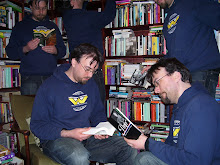
When I was a child I was obsessed with monsters, an obsession fuelled by avid watching of Doctor Who and various child-friendly versions of the Greek myths. My Bible at the time was the Usborne Book of Monsters. And then, when I was about 12 or so, a great-uncle gave me a copy of Jorge Luis Borges' Book of Imaginary Beings, with Peter Goodfellow's Bosch-y cover painting. It blew my tiny mind, because it wasn't just an encyclopaedia of monsters, but was funny and clever and inventive at the same time--a collection of stories disguised as a reference book. It got me hooked on Borges well before I could understand more than a fraction of what he wrote about.
Cut to last week, when I got copies of two collections of Borges' poetry: Poems of the Night and The Sonnets. They're beautiful collections, made even more so by the covers designed by Ben Wiseman.
Three collections of Borges' essays are also due soon from Penguin, with more Wiseman covers.
Wiseman has produced a number of other great covers for a variety of publishers. Here are some of my favourites, starting with three elegant Chekhovs.



















10 comments:
Thanks for posting this! I'm a recent Borges convert (in part because Alberto Manguel makes so much of him in The Library at Night) and I've been reading his short stories from the elegant Collected Fictions volume (also published by Penguin).
I work in a bookstore and fell upon the Penguin Classics two poetry collections that just came out and also immediately fell in love with them for their content and covers, which are a respectful nod at the author, while representing his style of writing and themes beautifully. I really like how they accented the line separating the cover art from usual "penguin classics" line so it matches with the design.
What does the shadow under "Loser's" say?
Or, asked another way, why is the shadow not the shadow of the word "Loser's"?
What does it all MEAN?
Chasch: That stories collection is great. And I agree whole-heartedly about the dividing line thing, too--it works really well.
Tulkinghorn: The shadow says 'LA', which is the setting of the book, though it may not be very clear in the small image I used.
Good God, these are amazing!
chasch: I'd recommend looking for a different edition. The translations Penguin commissioned from Hurley are godawful, and were the largely the result of a cash grab from his estate, as the rights to the translations that Borges approved (and in many cases, also worked on himself) are owned jointly by the translators. The new ones are not, and they are far inferior, if a little more complete.
JRSM: Any idea who's translating these new releases?
August: Eaqch of the poetry collections has a whole range of translators--around a dozen for each book, including Edith Grossman, John Updike, Willis Barnstone, Charles Tomlinson, Mark Strand, Robert Fitzgerald, Alastair Reid and Stephen Kessler.
August: I read somewhere online (although now I can't find where, of course!) about some of Borges' story being translated by an american in collaboration with Borges. More than just translations, what they produced was a collaborative rewriting of some of the stories. I remember the american translator in question (whose name is lost in my mind and my computer with the link, does anyone know who I'm talking about?) stating in an interview that he had posted these new versions of the stories online and being rebuked by Penguin for having done so. This may be one of the translations you're speaking of. As far as I know, they aren't published. Until I find something better, I suppose Hurley's work is going to have to do. It seems efficacious enough, maybe a tad dry at times... Can you suggest a better one if you know any?
I know the new poetry collections (the sonnet ones, at least, I didn't leaf through the other) include the spanish versions of the poem, which is nice for matters of alliteration and rhyme scheme and such, even if I can't understand all the words.
Sorry for cluttering the comments. I found the translator I was talking about. His name is Norma Thomas Di Giovanni. He talks about his work with Borges and why he can't publish it on his website: http://www.digiovanni.co.uk/borges.htm
All the stories have been removed.
Chasch: Yeah, Di Giovanni is the guy.
They aren't perfect, but I much prefer the translations in Labyrinths to Hurley's. Hurley's translations have been taken apart by a number of reviewers (including Manguel himself), but my biggest complaint is, frankly, if his ear for English is that flat, what must his ear for Spanish be like?
Thanks for posting these! I also love Borges, and these covers are a wonderful homage to the writer and visual companion to his words. The other cover designs are beautiful too!
Post a Comment